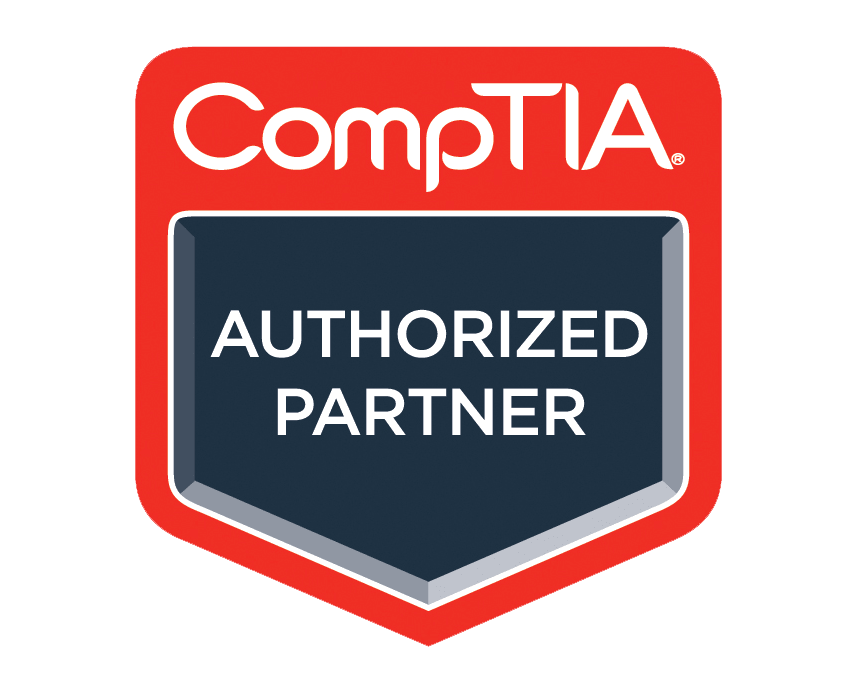Cybersecurity
with
Self-Paced course + Mentor Support
The Computing Technology Industry Association (CompTIA) is a leading voice and advocate for the $5 trillion global information technology ecosystem; and the estimated 75 million industry and tech professionals who design, implement, manage and safeguard the technology that powers the world’s economy.
Upon completion of training, the students are fully prepared for the following certification exams. However, they are not a requirement for graduation.
Security+
CompTIA Security+ is a global certification that validates the baseline skills necessary to perform core security functions and pursue an IT security career. Security+ opens the door to your cybersecurity career.
CySA+
CompTIA Cybersecurity Analyst (CySA+) is a certification for cyber professionals tasked with incident detection, prevention and response through continuous security monitoring.
-
Why is Security+ different?
More choose Security+ - chosen by more corporations and defense organizations than any other certification on the market to validate baseline security skills and for fulfilling the DoD 8570 compliance.
Security+ proves hands-on skills – the only baseline cybersecurity certification emphasizing hands-on practical skills, ensuring the security professional is better prepared to problem solve a wider variety of today’s complex issues.
More job roles turn to Security+ to supplement skills – baseline cybersecurity skills are applicable across more of today’s job roles to secure systems, software and hardware.
Security+ is aligned to the latest trends and techniques – covering the most core technical skills in risk assessment and management, incident response, forensics, enterprise networks, hybrid/cloud operations, and security controls, ensuring high-performance on the job.
What Skills Will You Learn?
Attacks, Threats and Vulnerabilities
Focusing on more threats, attacks, and vulnerabilities on the Internet from newer custom devices that must be mitigated, such as IoT and embedded devices, newer DDoS attacks, and social engineering attacks based on current events.
Operations and Incident Response
Covering organizational security assessment and incident response procedures, such as basic threat detection, risk mitigation techniques, security controls, and basic digital forensics.
Architecture and Design
Includes coverage of enterprise environments and reliance on the cloud, which is growing quickly as organizations transition to hybrid networks.
Governance, Risk and Compliance
Expanded to support organizational risk management and compliance to regulations, such as PCI-DSS, SOX, HIPAA, GDPR, FISMA, NIST, and CCPA.
Implementation
Expanded to focus on administering identity, access management, PKI, basic cryptography, wireless, and end-to-end security.
-
Security Administrator
Systems Administrator
Helpdesk Manager / Analyst
Network / Cloud Engineer
Security Engineer / Analyst
DevOps / Software Developer
IT Auditors
IT Project Manager
-
CompTIA Security+ is the first security certification a candidate should earn. It establishes the core knowledge required of any cybersecurity role and provides a springboard to intermediate-level cybersecurity jobs. Security+ incorporates best practices in hands-on troubleshooting, ensuring candidates have practical security problem-solving skills required to:
Assess the security posture of an enterprise environment and recommend and implement appropriate security solutions
Monitor and secure hybrid environments, including cloud, mobile, and IoT
Operate with an awareness of applicable laws and policies, including principles of governance, risk, and compliance
Identify, analyze, and respond to security events and incidents
Security+ is compliant with ISO 17024 standards and approved by the US DoD to meet directive 8140/8570.01-M requirements. Regulators and government rely on ANSI accreditation, because it provides confidence and trust in the outputs of an accredited program. Over 2.3 million CompTIA ISO/ANSI-accredited exams have been delivered since January 1, 2011.
Maximum of 90 questions
Multiple choice and performance-based questions
90 minutes
Passing Score: 750 (on a scale of 100-900)
-
Stand out in Cybersecurity!
Demonstrate Competency of Current Trends: Make yourself a valuable team member and show your knowledge of current trends that affect the daily work of security analysts, such as cloud and hybrid environments.
Proactively Monitor and Detect: Demonstrate your skills in detecting and analyzing indicators of malicious activity using the most up-to-date methods and tools, such as threat intelligence, security information and event management (SIEM), endpoint detection and response (EDR) and extended detection and response (XDR).
Respond to Threats, Attacks and Vulnerabilities: Prove your knowledge of incident response and vulnerability management processes and highlight the communication skills critical to security analysis and compliance
What You’ll Learn:
Security Operations
Improve processes in security operations and differentiate between threat intelligence and threat hunting concepts; identify and analyze malicious activity using the appropriate tools and techniques
Incident Response and Management
Apply updated concepts of attack methodology frameworks, perform incident response activities and understand the incident management lifecycle
Vulnerability Management
Implement and analyze vulnerability assessments, prioritize vulnerabilities and make recommendations on mitigating attacks and vulnerability response
Reporting and Communication
Apply communication best practices in vulnerability management and incident response as it relates to stakeholders, action plans, escalation and metrics
Recommended Experience:
Network+, Security+ or equivalent knowledge. Minimum of 4 years of hands-on experience as an incident response analyst or security operations center (SOC) analyst, or equivalent experience.
-
Incident Response Analyst
Security Architect
Cybersecurity Engineer
Threat Hunter
Cybersecurity Analyst
Vulnerability Analyst
Security Operations Center (SOC)
Analyst Application
Security Analyst
Threat Intelligence Analyst
-
Maximum of 85 questions
Multiple choice and performance-based
165 minutes
Passing Score: 750 (on a scale of 100-900)
Recommended Experience Network+, Security+ or equivalent knowledge. Minimum of 4 years of hands-on information security or related experience.
CASP+
CompTIA Advanced Security Practitioner (CASP+) is an advanced-level cybersecurity certification for security architects and senior security engineers charged with leading and improving an enterprise’s cybersecurity readiness.
PenTest+
CompTIA PenTest+ is for cybersecurity professionals tasked with penetration testing and vulnerability management.
-
CASP+ is the only hands-on, performance-based certification for advanced practitioners — not managers — at the advanced skill level of cybersecurity. While cybersecurity managers help identify what cybersecurity policies and frameworks could be implemented, CASP+ certified professionals figure out how to implement solutions within those policies and frameworks.
Unlike other certifications, CASP+ covers both security architecture and engineering – CASP+ is the only certification on the market that qualifies technical leaders to assess cyber readiness within an enterprise, and design and implement the proper solutions to ensure the organization is ready for the next attack.
What Skills Will You Learn?
Security Architecture
Expanded coverage to analyze security requirements in hybrid networks to work toward an enterprise-wide, zero trust security architecture with advanced secure cloud and virtualization solutions.
Security Operations
Expanded emphasis on newer techniques addressing advanced threat management, vulnerability management, risk mitigation, incident response tactics, and digital forensics analysis.
Governance, Risk, and Compliance
Expanded to support advanced techniques to prove an organization’s overall cybersecurity resiliency metric and compliance to regulations, such as CMMC, PCI-DSS, SOX, HIPAA, GDPR, FISMA, NIST, and CCPA.
Security Engineering and Cryptography
Expanded to focus on advanced cybersecurity configurations for endpoint security controls, enterprise mobility, cloud/hybrid environments, and enterprise-wide PKI and cryptographic solutions.
-
Security Architect
Senior Security Engineer
SOC Manager
Security Analyst
-
Maximum of 90 questions
Multiple-choice and performance-based questions
165 Minutes
This test has no scaled score; it’s pass/fail only.
Recommended Experience
A minimum of ten years of general hands-on IT experience, with at least five years of broad hands-on security experience.
-
CompTIA PenTest+ is the most comprehensive exam covering all penetration testing stages. Unlike other penetration testing exams that only cover a portion of stages with essay questions and hands-on, PenTest+ uses both performance-based and knowledge-based questions to ensure all stages are addressed.
PenTest+ is the only exam on the market to include all aspects of vulnerability management. It not only covers hands-on vulnerability assessment, scanning, and analysis, but also includes planning, scoping, and managing weaknesses, not just exploiting them.
PenTest+ is the most current penetration testing exam covering the latest techniques against expanded attack surfaces. It is a unique exam that requires a candidate to demonstrate the most relevant pen testing skills for the cloud, hybrid environments, web applications, Internet of Things (IoT), and traditional on-premises.
What Skills Will You Learn?
Planning and Scoping
Includes updated techniques emphasizing governance, risk, and compliance concepts, scoping and organizational/customer requirements, and demonstrating an ethical hacking mindset.
Information Gathering and Vulnerability Scanning
Includes updated skills on performing vulnerability scanning and passive/active reconnaissance, vulnerability management, as well as analyzing the results of the reconnaissance exercise.
Attacks and Exploits
Includes updated approaches to expanded attack surfaces, researching social engineering techniques, performing network attacks, wireless attacks, application-based attacks and attacks on cloud technologies, and performing post-exploitation techniques.
Reporting and Communication
Expanded to focus on the importance of reporting and communication in an increased regulatory environment during the pen testing process through analyzing findings and recommending appropriate remediation within a report.
Tools and Code Analysis
Includes updated concepts of identifying scripts in various software deployments, analyzing a script or code sample, and explaining use cases of various tools used during the phases of a penetration test. It is important to note that no scripting and coding is required.
-
Penetration Tester
Security Consultant
Cloud Penetration Tester
Web App Penetration Tester
Cloud Security Specialist
Network & Security Specialist
-
Maximum of 85 questions
Performance-based and multiple choice questions
165 minutes
Passing Score: 750 (on a scale of 100-900)
Recommended Experience
Network+, Security+ or equivalent knowledge. Minimum of 3-4 years of hands-on information security or related experience. While there is no required prerequisite, PenTest+ is intended to follow CompTIA Security+ or equivalent experience and has a technical, hands-on focus.
Tuition & Program Info
$3,038
Tuition with exam vouchers: $4,684
Total Duration: 8 Months
This program is self-paced and entirely online. Self-paced programs create a unique learning experience that allows students to learn independently and at a pace that best suits them.
What’s included?
Virtual practice labs
Practice exams
Mentor support
Prerequisites: HS diploma/GED and computer networking skills
Students have full online access to the program for 1 year.
Course Breakdown
-
The Present Threat Landscape
Types of Malware
Social Engineering and Related Attacks
Application and Service Attacks
Cryptographic and Wireless Attacks
Penetration Testing and Vulnerability Scanning
Impacts from Vulnerability Types
Components Supporting Organizational Security
Security Assessment Using Software Tools
Cryptography
Public Key Infrastructure
Wireless Security Settings
Analyzing Output from Security Technologies
Deploying Mobile Devices Securely
Implementing Secure Protocols
Troubleshooting Common Security Issues
Identity Concepts and Access Services
Identity and Access Management Controls
Common Account Management Practices
Frameworks, Guidelines, and Physical Security
Implement Secure Network Architecture Concepts
Secure System and Application Design and Deployment
Cloud, Virtualization, and Resiliency Concepts
Policies, Plans, and Procedures
Business Impact Analysis and Risk Management
Incident Response, Forensics, and Disaster Recovery
-
Network Security Concepts
Managing Network Settings
Cloud Computing & Cybersecurity
Virtualization & Container Security
Data Security Standards
Threat Intelligence
Managing Risk
Business Continuity
OS Process Management
Authentication
Authorization
Cryptography
Public Key Infrastructure
Firewalls & Intrusion Detection
Malware
Analyzing Malicious Activity
-
Assessing and Managing Risks
Virtualization Security
Secure Cloud Computing
Cryptography and PKI
Storage and Network Security
Authentication and Authorization
IT Governance and Security Compliance
Mobile and Embedded Devices
Industrial Computing Environments
Emerging Technologies and SecDevOps
Monitoring and Incident Response
Vulnerabilities and Hardening
Digital Forensics
Business Continuity
REFERENCE MANUAL: Advanced Security Practitioner CompTIA-CASP: CAS-004 Exam Review Questions
-
Planning for an Engagement
Scoping an Engagement
Information Gathering
Vulnerability Identification
Social Engineering and Specialized System Attacks
Network-Based Exploits
Application-Based Vulnerabilities
Local Host Vulnerabilities
Post-Exploitation and Facilities Attacks
Penetration Testing Tools
Analyzing Tool and Script Output
Reporting and Communication
REFERENCE MANUAL: CompTIA PenTest+ Certification Practice Exams (Exam PT0-001)



